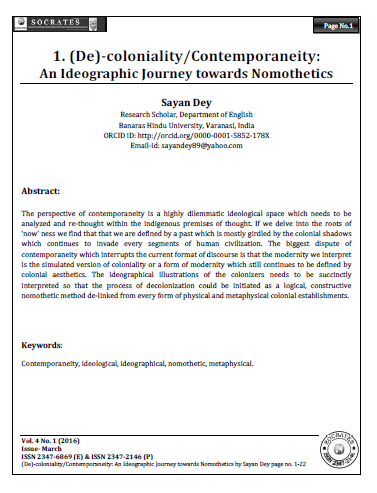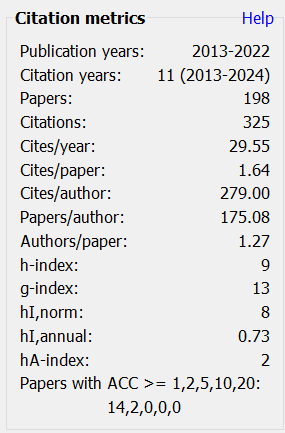(De)-coloniality/Contemporaneity
An Ideographic Journey towards Nomothetics
Keywords:
Contemporaneity, ideological, ideographical, nomothetic, metaphysicalAbstract
The perspective of contemporaneity is a highly dilemmatic ideological space which needs to be analyzed and re-thought within the indigenous premises of thought. If we delve into the roots of ‘now’ ness we find that that we are defined by a past which is mostly girdled by the colonial shadows which continues to invade every segments of human civilization. The biggest dispute of contemporaneity which interrupts the current format of discourse is that the modernity we interpret is the simulated version of coloniality or a form of modernity which still continues to be defined by colonial aesthetics. The ideographical illustrations of the colonizers needs to be succinctly interpreted so that the process of decolonization could be initiated as a logical, constructive nomothetic method de-linked from every form of physical and metaphysical colonial establishments.
Downloads
Metrics
References
Appadurai, A. (1990). ‘Disjuncture and Difference in the Global Cultural Economy’, Theory, Culture and Society 295-310.
ASU Libraries. 2013, December 12.Gerald Taiaiake Alfred: Resurgence of Traditional Ways of Being [Video file] Retrieved from https://youtu.be/3ABP5QhetYs
Duncan, R. (1951). Selected Writings of Mahatma Gandhi. London: Faber and Faber Limited.
Desai, A., & Vahed, G. (2015). The South African Gandhi: Stretcher-Bearer of the Empire. New Delhi: Navayana Publishing House.
Escobar, A. (2007). . World and Knowledges Otherwise’ Cultural Studies, 21(2), 179-210.
Fanon, F. (2001). The Wretched of the Earth. United Kingdom. : Penguin Publishers.
Gikandi, S. (2015). XIII Theory and Praxis Course Lecture’, 30. : Shillong.
Gikandi, S. (2015). XIII Theory and Praxis Course Lecture’, 30. Shillong: Shillong.
Hobbes, T. (2007). Hobbes and Bramhall on liberty and necessity. Leviathan. Radford: Wilder Publications.
Lyotard, J. F. (1984). The Postmodern Condition. United Kingdom. : Manchester University Press.
Maldonado-Torres, N. (2007). On the Coloniality of Being: Contributions to the development of a Concept’. Cultural Studies, 21(2), 240-270.
Maturana Humberto R, (1992). The Tree of Knowledge: The Biological Roots of Human Understanding. Boston: Shambhala Publishers.
Mignolo, W. D. (2007). Delinking: The rhetoric of modernity, the logic of coloniality and the grammar of de-coloniality’. Cultural Studies, 21(2), 449-514.
Plato, (2013). The Republic. United Kingdom. : Maple Press.
Quijano, A. (2007). Coloniality and Modernity/Rationality’. Cultural Studies, 21(2), 168-178.
Richter, G. (2014). Afterness: Figures of Following in Modern Though and Aesthetics. New York: Columbia University Press.
Sarkar, S. (2009). . Bangladesh: Kavigaan. Bangladesh: Asiatic Society.
Simpson, L. B. (2014). Land as pedagogy: Nishnaabeg intelligence and rebellious transformation’, Decolonization: Indigeneity. Education and Society,3(3), 1-25.
Schmitt, C. (2006). The Nomos of the Earth: in the International Law of the Jus Publicum Europaeum. USA: Telos Press Publishing.

Downloads
Published
How to Cite
Issue
Section
License
Revised Copyright/CC license that applies to all the articles published after 05-02-2017
Attribution-NonCommercial 4.0 International (CC BY-NC 4.0)

Copyright/CC license that applies to all the articles published before 05-02-2017
Attribution-Non Commercial-No Derivatives 4.0 International (CC BY-NC-ND 4.0)

Author(s) will retain all the right except commercial and re-publishing rights. In the case of re-publishing, they will have to obtain written permission from the journal. Additional licensing agreements (Creative Commons licenses) grants rights to readers to copy, distribute, display and perform the work as long as you give the original author(s) credit, they can not use the works for commercial purposes and are not allowed to alter, transform, or build upon the work. For any reuse or distribution, readers and users must make clear to others the license terms of this work. Any of these conditions can be waived if you get permission from the copyright holders. Nothing in this license impairs or restricts the authors’ rights. To view a copy of this license, visit http://creativecommons.org/licenses/by-nc-nd/4.0/ or send a letter to Creative Commons, 171 Second Street, Suite 300, San Francisco, California, 94105, USA.
Research Papers published in SOCRATES are licensed under an Attribution-NonCommercial-NoDerivatives 4.0 International (CC BY-NC-ND 4.0)












